Charles E W Bean, Diaries, AWM38 3DRL 606/272/1 - 1917 - 1932 - Part 7
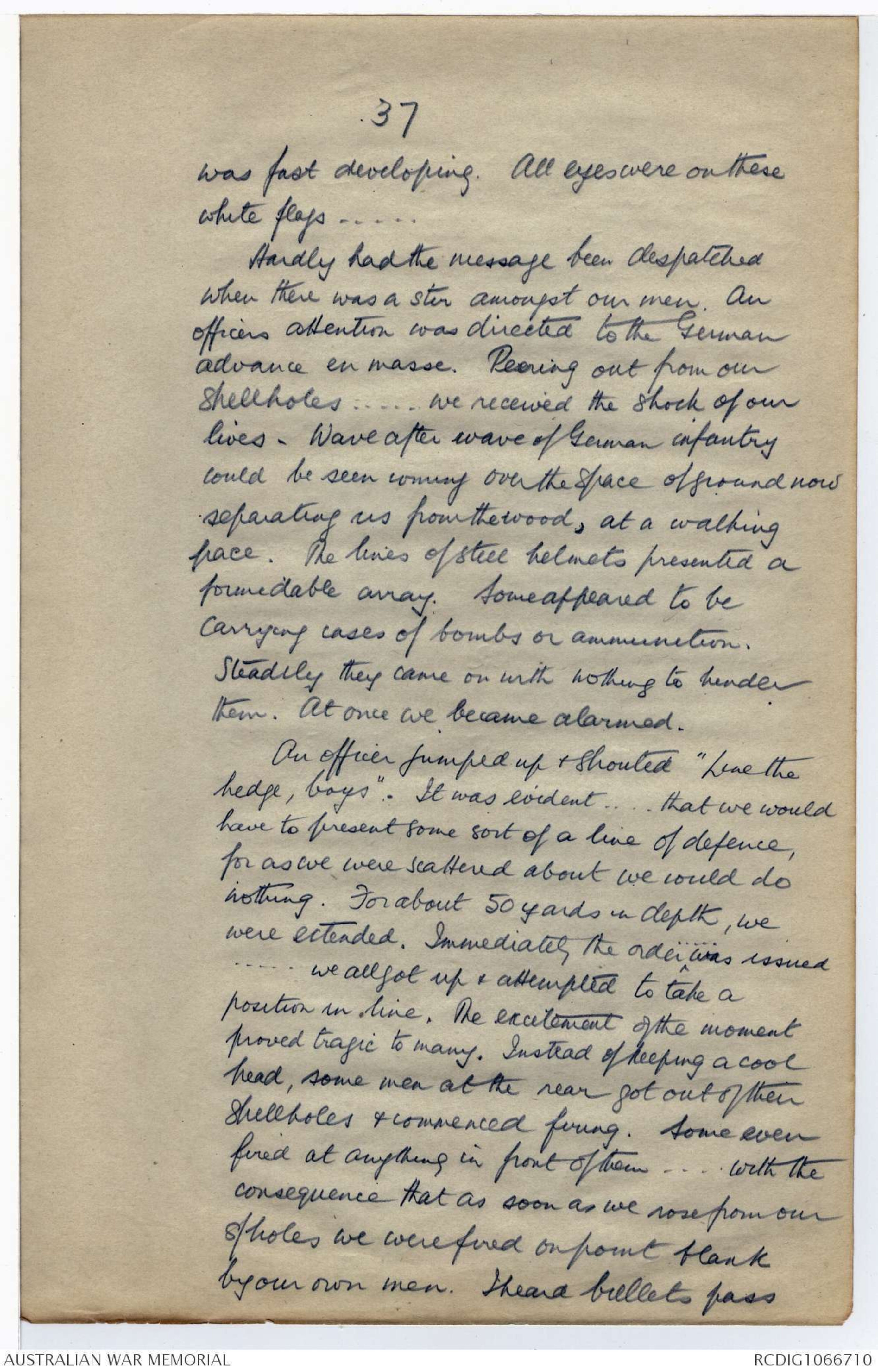
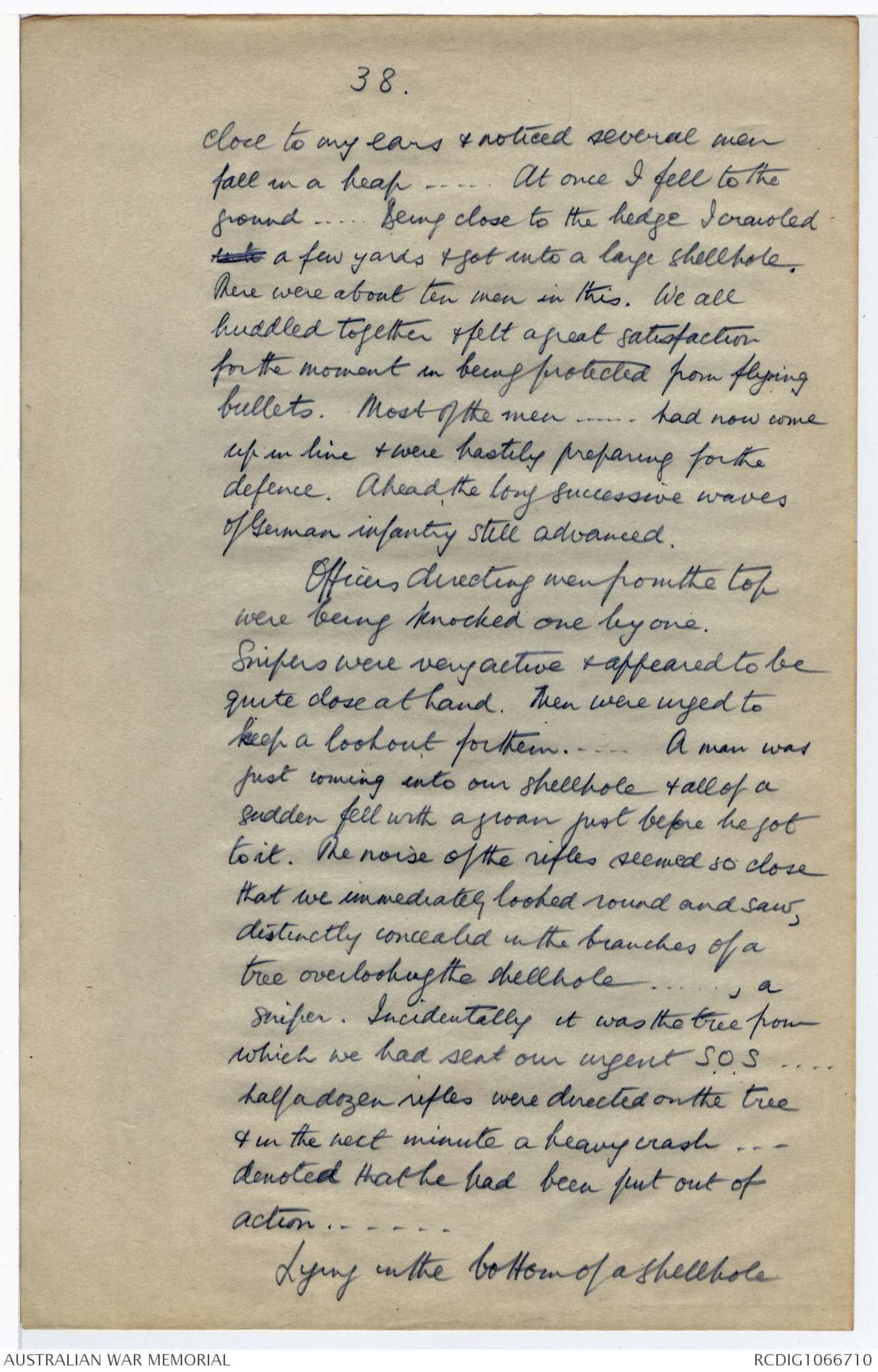
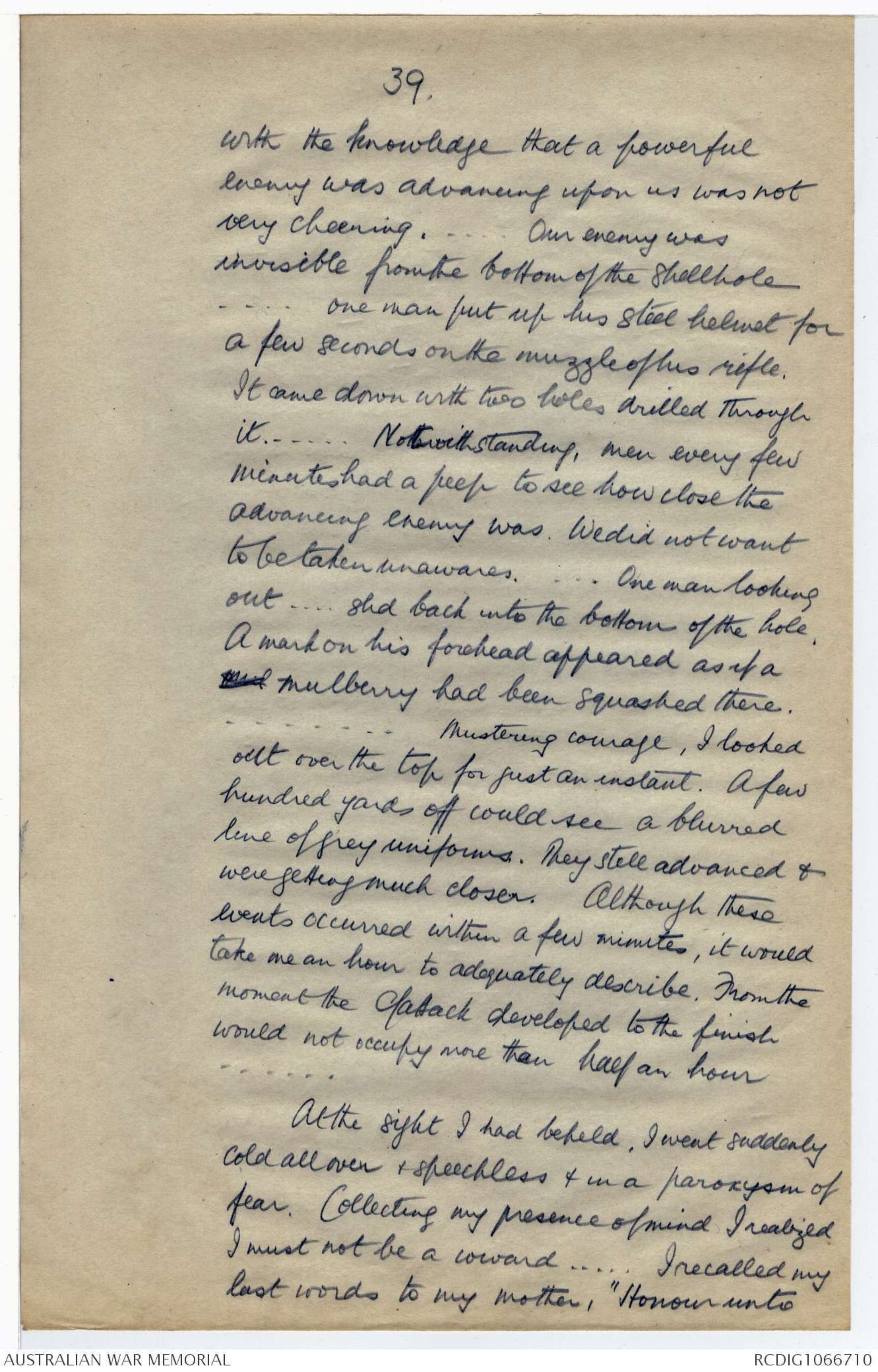
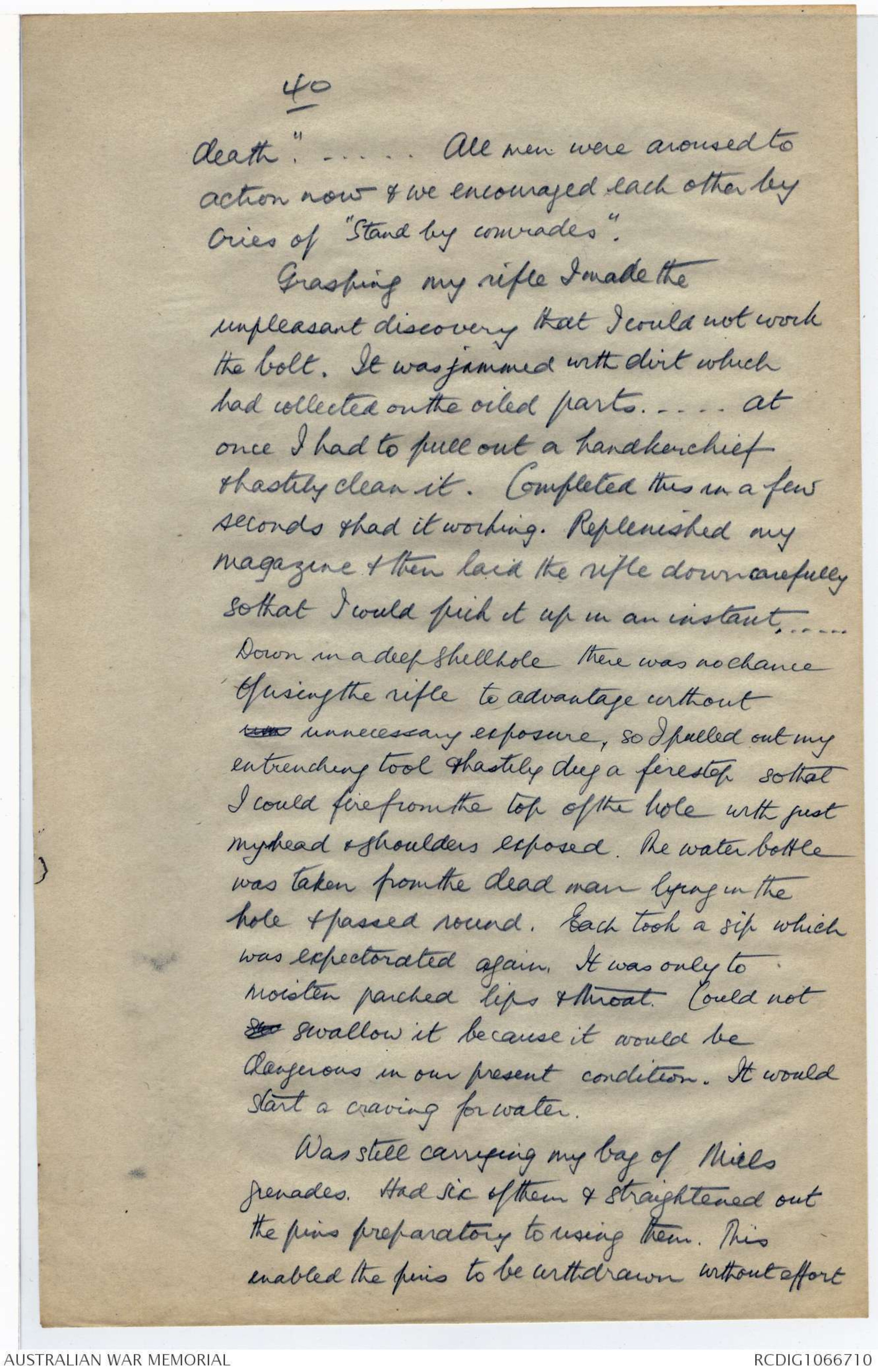
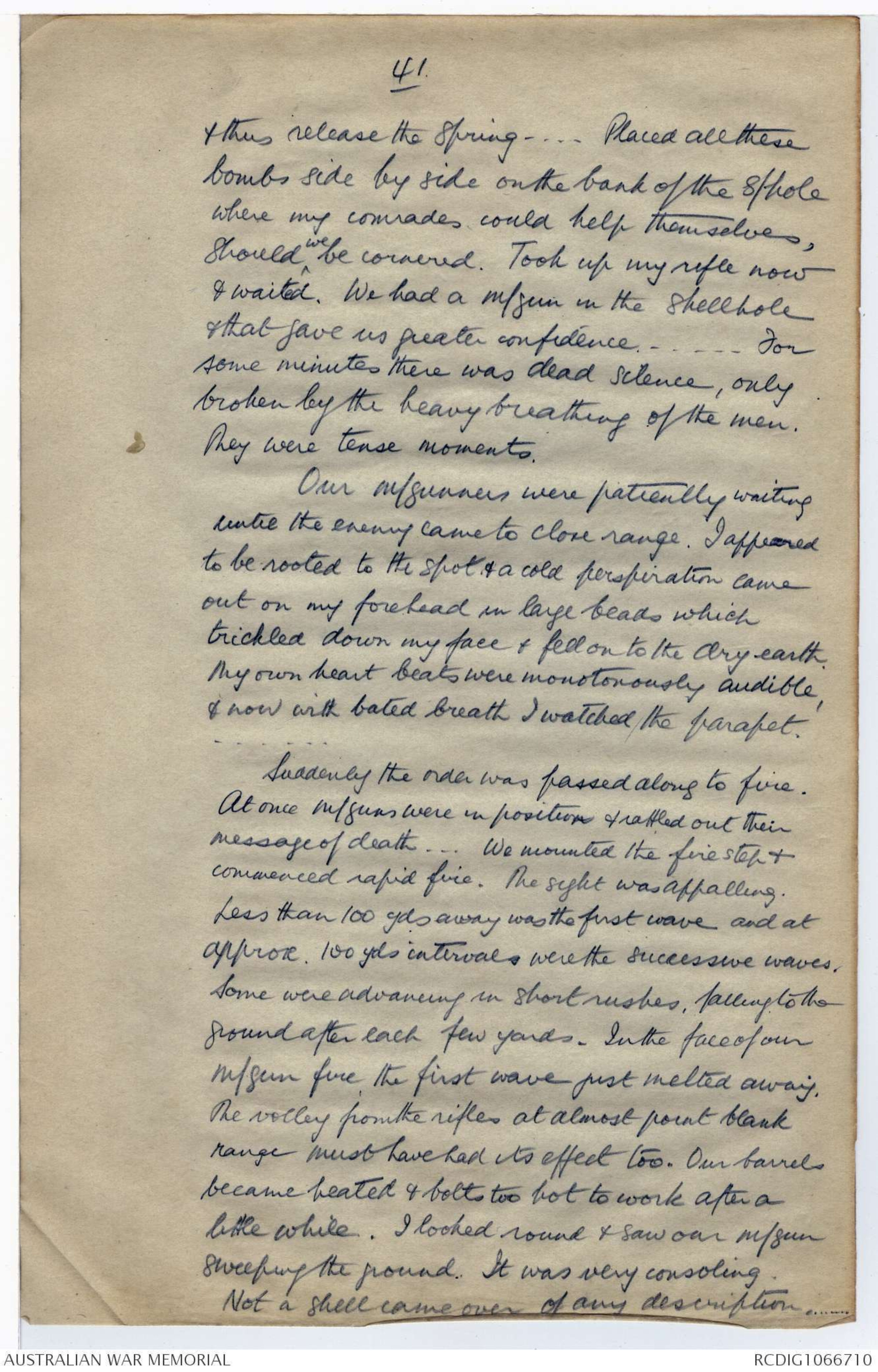
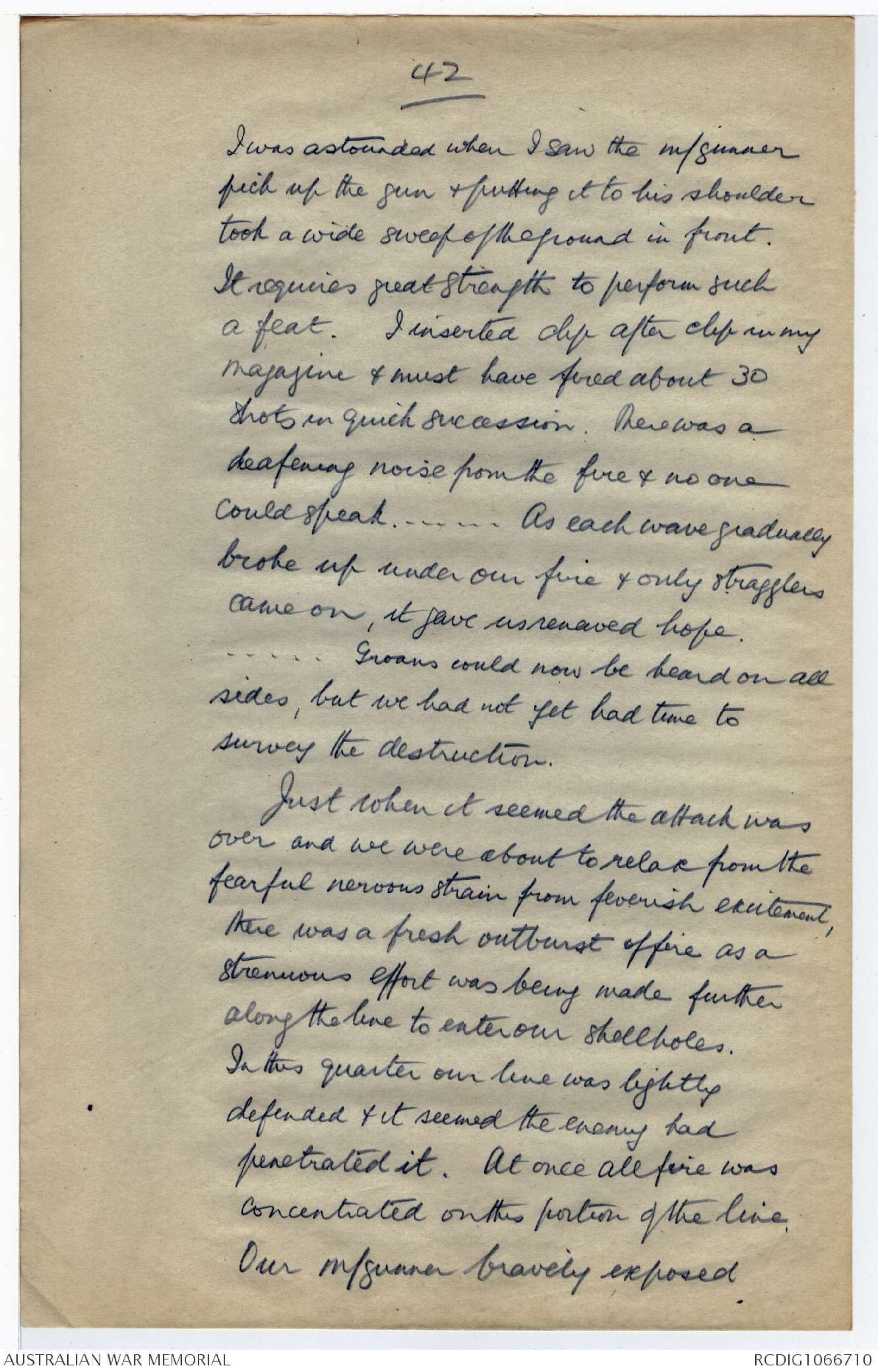
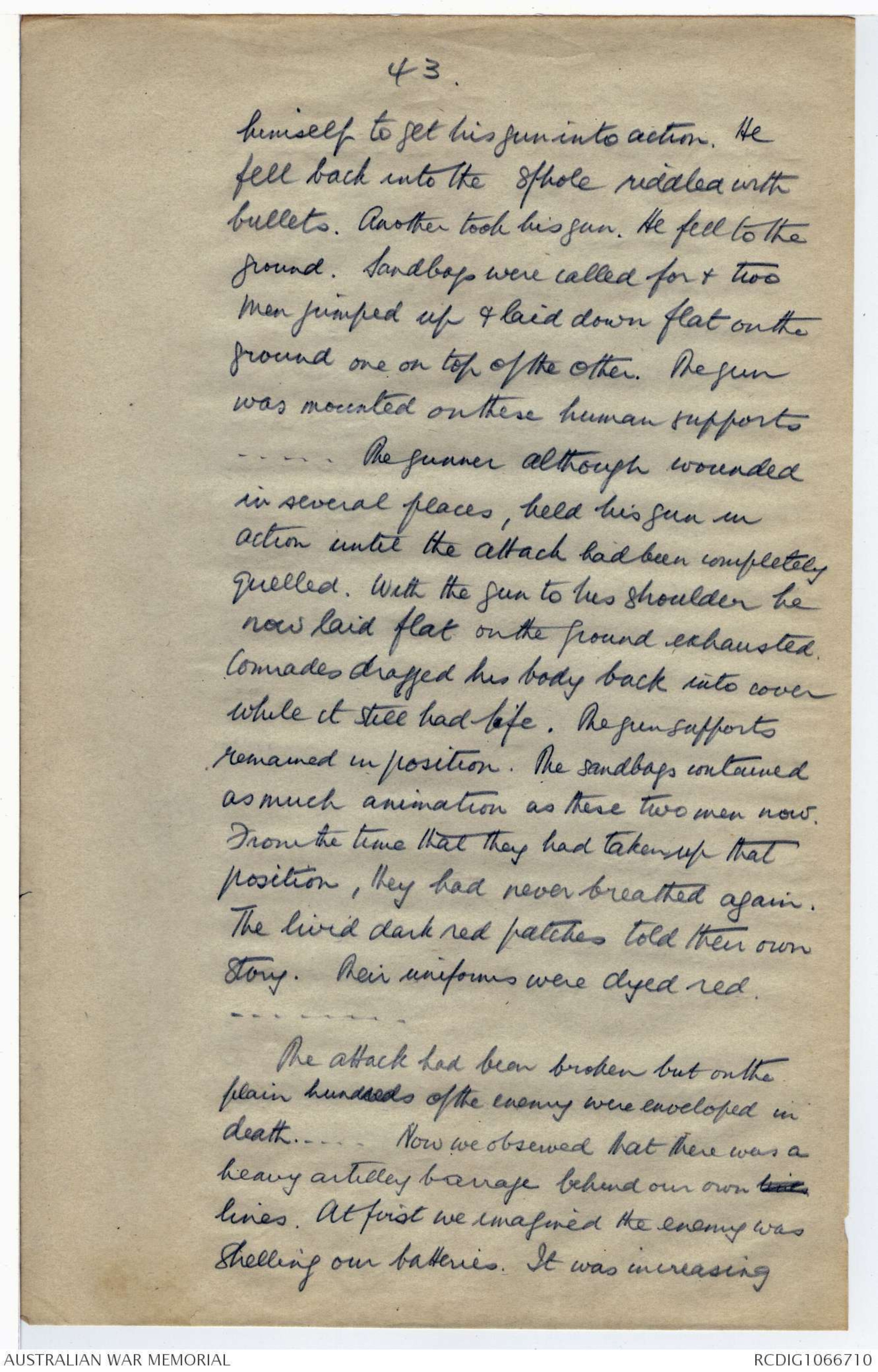
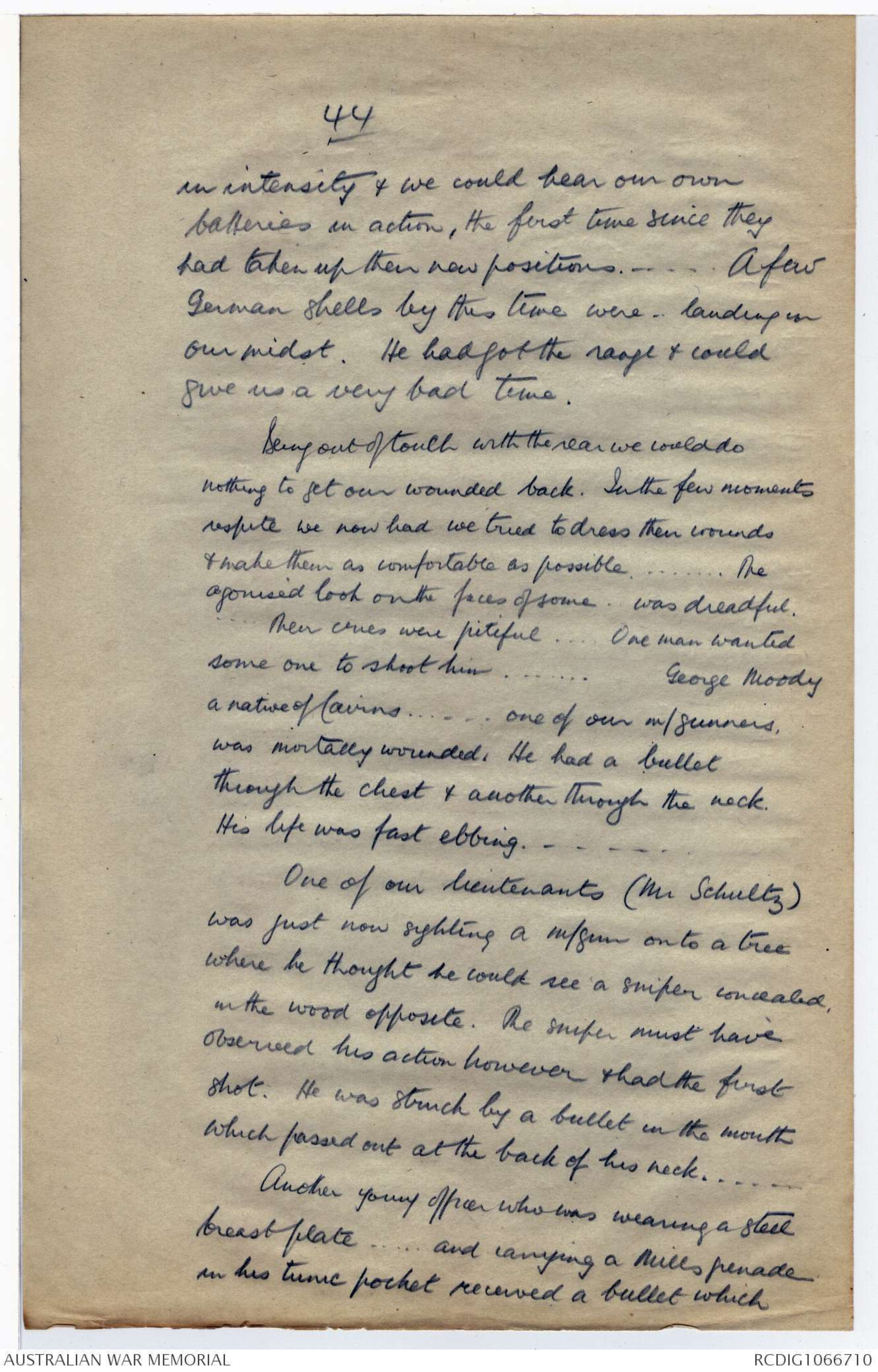
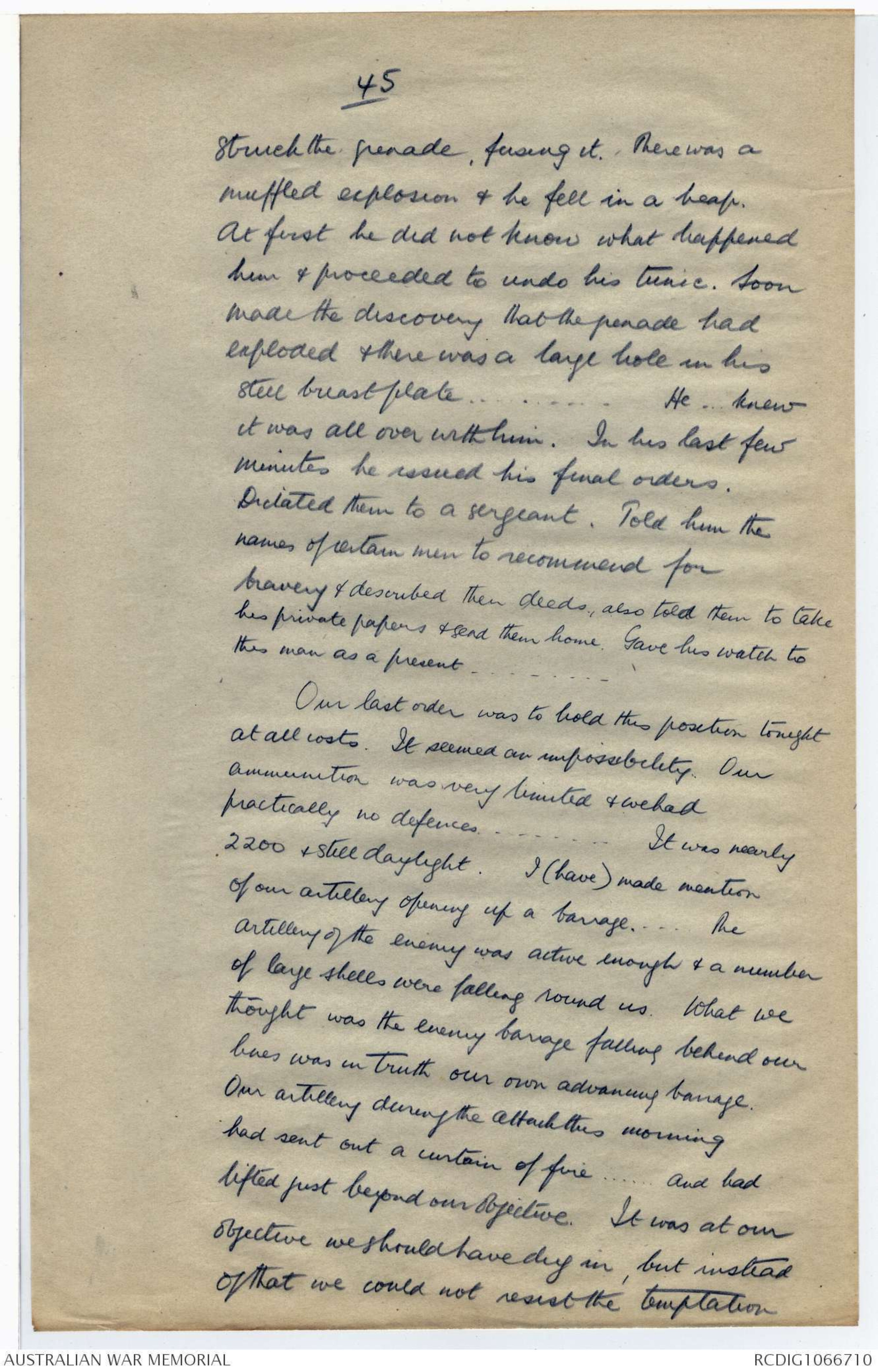
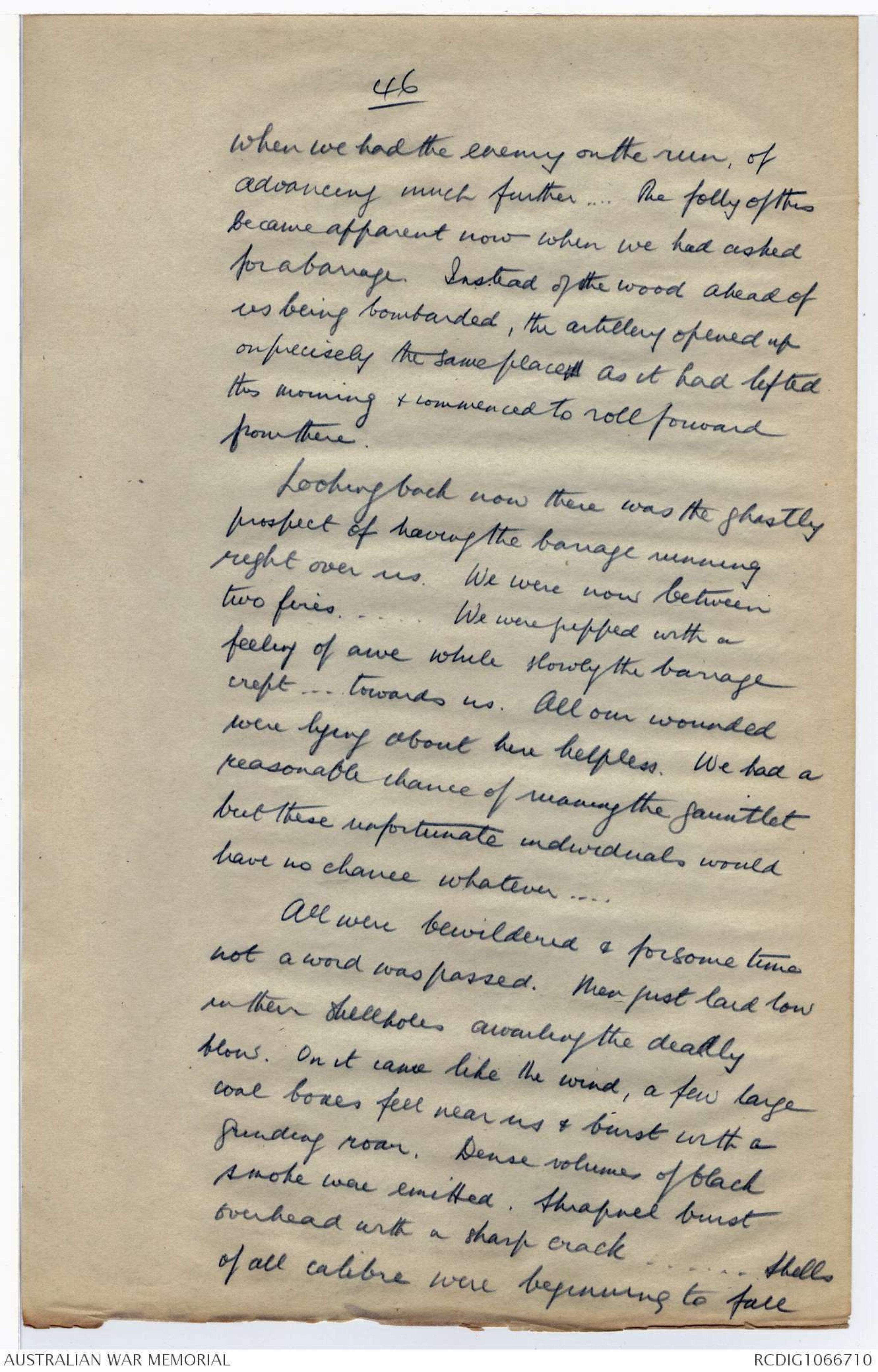
37
was fast developing. All eyes were on these
white flags . . .
Hardly had the message been despatched
when there was a stir amongst our men. An
officers attention was directed to the German
advance en masse. Peering out from our
shellholes . . . . we received the shock of our
lives - Wave after wave of German infantry
could be seen coming over the space of ground now
separating us from the wood, at a walking
pace. The lines of steel helmets presented a
formidable array. Some appeared to be
carrying cases of bombs or ammunition.
Steadily they came on with nothing to hinder
them. At once we became alarmed.
An officer jumped up & shouted "Line the
hedge, boys". It was evident. . . . that we would
have to present some sort of a line of defence
for as we were scattered about we could do
nothing. For about 50 yards in depth, we
were extended. Immediately the order ^ . . . .was issued
. . . .we all got up & attempted to take a
position in line. The excitement of the moment
proved tragic to many. Instead of keeping a cool
head, some men at the rear got out of their
shellholes & commenced firing. Some even
fired at anything in front of them. . . with the
consequence that as soon as we rose from our
s/holes we were fired on point blank
by our own men. I heard bullets pass
38.
close to my ears & noticed several men
fall in a heap . . . At once I fell to the
ground . . . Being close to the hedge I crawledback a few yards & got into a large shellhole.
There were about ten men in this. We all
huddled together & felt a great satisfaction
for the moment in being protected from flying
bullets. Most of the men. . . . .had now come
up in line & were hastily preparing for the
defence. Ahead the long successive waves
of German infantry still advanced.
Officers directing men from the top
were being knocked one by one.
Snipers were very active & appeared to be
quite close at hand. Then were urged to
keep a lookout for them. . . . . A man was
just coming into our shellhole & all of a
sudden fell with a groan just before he got
to it. The noise of the rifles seemed so close
that we immediately looked round and saw
distinctly concealed in the branches of a
tree overlooking the shellhole. . . . . , a
sniper. Incidentally it was the tree from
which we had sent our urgent SOS. . . .
half a dozen rifles were directed on the tree
& in the next minute a heavy crash. . .
denoted that he had been put out of
action. . . . . .
Lying in the bottom of a shellhole
39.
with the knowledge that a powerful
enemy was advancing upon us was not
very cheering. . . . . Our enemy was
invisible from the bottom of the shellhole
. . . . one man put up his steel helmet for
a few seconds on the muzzle of his rifle.
It came down with two holes drilled through
it. . . . . . Notwithstanding, men every few
minutes had a peep to see how close the
advancing enemy was. We did not want
to be taken unawares . . . . . One man looking
out. . . . slid back into the bottom of the hole
A mark on his forehead appeared as if a
mulberry had been squashed there.
. . . . . . . Mustering courage, I looked
out over the top for just an instant. A few
hundred yards off could see a blurred
line of grey uniforms. They still advanced &
were getting much closer. Although these
events occurred within a few minutes, it would
take me an hour to adequately describe. From the
moment the c/attack developed to the finish
would not occupy more than half an hour
. . . . . .
At the sight I had beheld, I went suddenly
cold all over & speechless & in a paroxysm of
fear. Collecting my presence of mind, I realized
I must not be a coward. . . . . I recalled my
last words to my mother, "Honour unto
40
death.". . . . . . All men were aroused to
action now & we encouraged each other by
Cries of "Stand by comrades".
Grasping my rifle I made the
unpleasant discovery that I could not work
the bolt. It was jammed with dirt which
had collected on the oiled parts. . . . . At
once I had to pull out a handkerchief
& hastily clean it. Completed this in a few
seconds & had it working. Replenished my
magazine & then laid the rifle down carefully
so that I could pick it up in an instant, . . . . . .
Down in a deep shellhole there was no chance
of using the rifle to advantage withoutum unnecessary exposure, so I pulled out my
entrenching tool & hastily dug a firestep so that
I could fire from the top of the hole with just
my head & shoulders exposed. The water bottle
was taken from the dead man lying in the
hole & passed round. Each took a sip which
was expectorated again. It was only to
moisten parched lips & throat. Could notsw swallow it because it would be
dangerous in our present condition. It would
start a craving for water.
Was still carrying my bag of Mills
grenades. Had six of them & straightened out
the pins preparatory to using them. This
enabled the pins to be withdrawn without effort
41.
& thus release the Spring. . . . Placed all these
bombs side by side on the bank of the s/hole
where my comrades could help themselves,
should we be cornered. Took up my rifle now
& waited. We had a m/gun in the shellhole
& that gave us greater confidence. . . . For
some minutes there was dead silence, only
broken by the heavy breathing of the men.
They were tense moments.
Our m/gunners were patiently waiting
until the enemy came to close range. I appeared
to be rooted to the spot & a cold perspiration came
out on my forehead in large beads which
trickled down my face & fell on to the dry earth
My own heart beats were monotonously audible
& now with bated breath I watched the parapet.
Suddenly the order was passed along to fire.
At once m/guns were in position & rattled out their
message of death. . . . We mounted the firestep &
commenced rapid fire. The sight was appalling.
Less than 100 yds away was the first wave and at
approx. 100 yds intervals were the successive waves.
Some were advancing in short rushes, falling to the
ground after each few yards. In the face of our
m/gun fire, the first wave just melted away.
The volley from the rifles at almost point blank
range must have had its effect too. Our barrels
became heated & bolts too hot to work after a
little while. I looked round & saw our m/gun
sweeping the ground. It was very consoling
Not a shell came over of any description.
42
I was astounded when I saw the m/gunner
pick up the gun & putting it to his shoulder
took a wide sweep of the ground in front.
It requires great strength to perform such
a feat. I inserted clip after clip in my
magazine & must have fired about 30
shots in quick succession. There was a
deafening noise from the fire & no one
could speak . . . . As each wave gradually
broke up under our fire & only stragglers
came on, it gave us renewed hope.
. . . . . Groans could now be heard on all
sides, but we had not yet had time to
survey the destruction.
Just when it seemed the attack was
over and we were about to relax from the
fearful nervous strain from feverish excitement,
there was a fresh outburst of fire as a
strenuous effort was being made further
along the line to enter our shellholes.
In this quarter our line was lightly
defended & it seemed the enemy had
penetrated it. At once all fire was
concentrated on this portion of the line
Our m/gunner bravely exposed
43.
himself to get his gun into action. He
fell back into the s/hole riddled with
bullets. Another took his gun. He fell to the
ground. Sandbags were called for & two
men jumped up & laid down flat on the
ground one on top of the other. The gun
was mounted on these human supports
. . . . . The gunner although wounded
in several places, held his gun in
action until the attack had been completely
quelled. With the gun to his shoulder he
now laid flat on the ground exhausted
Comrades dragged his body back into cover
while it still had life. The gun supports
remained in position. The sandbags contained
as much animation as these two men now.
From the time that they had taken up that
position, they had never breathed again
The livid dark red patches told their own
story. Their uniforms were dyed red.
The attack had been broken but on the
plain hundreds of the enemy were enveloped in
death. . . . Now we observed that there was a
heavy artillery barrage behind our own
lines. At first we imagined the enemy was
shelling our batteries. It was increasing
44
in intensity & we could hear our own
batteries in action, the first time since they
had taken up their new positions. . . . . .A few
German shells by this time were . . landing in
our midst. He had got the range & could
give us a very bad time.
Being out of touch with the rear we could do
nothing to get our wounded back. In the few moments
respite we now had we tried to dress their wounds
& make them as comfortable as possible. . . . . The
agonised look on the faces of some. was dreadful.
. . . . their cries were pitiful. . . . One man wanted
some one to shoot him. . . . . George Moody
a native of Cairns. . . . . . one of our m/gunners,
was mortally wounded. He had a bullet
through the chest & another through the neck
His life was fast ebbing. . . . . .
One of our lieutenants (Mr Schultz)
was just now sighting a m/gun on to a tree
where he thought he could see a sniper concealed,
in the wood opposite. The sniper must have
observed his action however & had the first
shot. He was struck by a bullet in the mouth
which passed out at the back of his neck. . . . . .
Another young officer who was wearing a steel
breast plate. . . . . and carrying a Mills grenade
in his tunic pocket received a bullet which
45
struck the grenade, fusing it. There was a
muffled explosion & he fell in a heap.
At first he did not know what happened
him & proceeded to undo his tunic. Soon
made the discovery that the grenade had
exploded & there was a large hole in his
steel breast plate. . . . . . . . . He . . knew
it was all over with him. In his last few
minutes he issued his final orders.
Dictated them to a sergeant. Told him the
names of certain men to recommend for
bravery & described their deeds, also told them to take
his private papers & send them home. Gave his watch to
this man as a present. . . . . .
Our last order was to hold this position tonight
at all costs. It seemed an impossibility. Our
ammunition was very limited & we had
practically no defences . . . . It was nearly
2200 & still daylight. I (have) made mention
of our artillery opening up a barrage. . . . The
artillery of the enemy was active enough & a number
of large shells were falling round us. What we
thought was the enemy barrage falling behind our
lines was in truth our own advancing barrage.
Our artillery during the attack this morning
had sent out a curtain of fire. . . . . . and had
lifted just beyond our objective. It was at our
objective we should have dug in, but instead
of that we could not resist the temptation
46
when we had the enemy on the run, of
advancing much further. . . . The folly of this
became apparent now when we had asked
for a barrage. Instead of the wood ahead of
us being bombarded, the artillery opened up
on precisely the same places as it had lifted
this morning & commenced to roll forward
from there.
Looking back now there was the ghastly
prospect of having the barrage running
right over us. We were now between
two fires. . . . . We were gripped with a
feeling of awe while slowly the barrage
crept. . . towards us. All our wounded
were lying about here helpless. We had a
reasonable chance of running the gauntlet
but these unfortunate individuals would
have no chance whatever. . . .
All were bewildered & for some time
not a word was passed. Men just laid low
in their shellholes awaiting the deadly
blow. On it came like the wind, a few large
coal boxes fell near us & burst with a
grinding roar. Dense volumes of black
smoke were emitted. Shrapnel burst
overhead with a sharp crack. . . . . . Shells
of all calibre were beginning to fall
 Maralyn K
Maralyn KThis transcription item is now locked to you for editing. To release the lock either Save your changes or Cancel.
This lock will be automatically released after 60 minutes of inactivity.